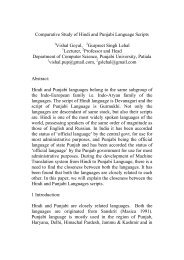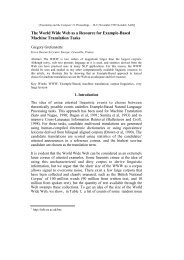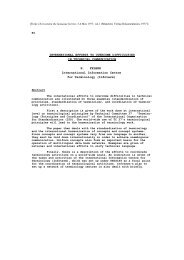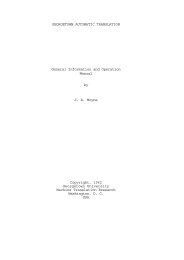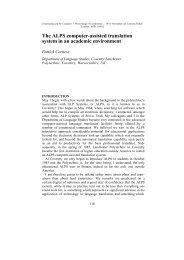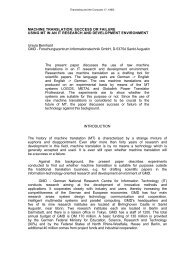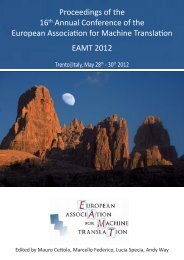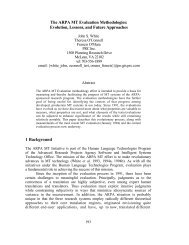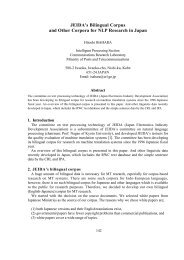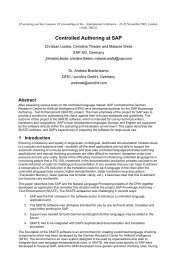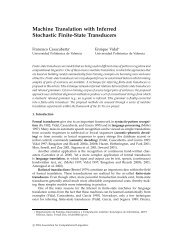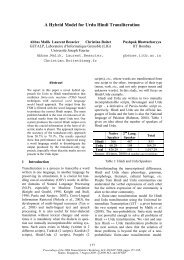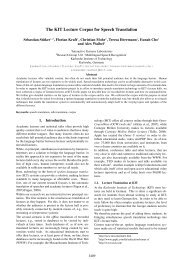pidgin translation - Machine Translation Archive
pidgin translation - Machine Translation Archive
pidgin translation - Machine Translation Archive
You also want an ePaper? Increase the reach of your titles
YUMPU automatically turns print PDFs into web optimized ePapers that Google loves.
78 META<br />
the original text to refer back to, would find himself looking less and less to the<br />
original text until he completely ignored it and worked entirely from the Pidgin.<br />
The reason for this prediction is that Pidgin text must by definition preserve all<br />
the information contained in the original. The translator would be bound to<br />
learn more and more of the correspondences between Pidgin words and the<br />
vocabulary of the source language, a process likely to be subconscious in the main.<br />
If he were pressed for time — and what translator is not? — he would certainly<br />
begin to exploit this knowledge and not look so frequently at the original text.<br />
In the French to English example given earlier, when he came across the Pidgin<br />
word tongue, he would have a strong expectation that if he looked in the original<br />
text he would find langue. This informal learning would continue until the<br />
translator did not look at the source text at all. But if an experienced translator<br />
can eventually dispense with source texts, is it essential or efficient to insist that<br />
newcomers should be able to read text in the source language in the first place?<br />
Indeed if, as we shall argue, it is easier to learn Pidgin than an original language,<br />
then it ought to be cheaper and faster to train a translator to translate from Pidgin<br />
English into English (or from Pidgin French into French) than to do real <strong>translation</strong>.<br />
And it being cheaper and faster to train people to translate from Pidgin, one would<br />
expect there to be an easier supply of them 9 .<br />
At the introduction of any new technology, people can fear the worst<br />
(« being made redundant by the computer ») or they can profit from the innovation.<br />
There is, of course, no immediate danger of redundancy; Pidgin <strong>translation</strong> would<br />
be most profitably applied to translating languages for which there is the most<br />
serious dearth of translators. And even taking the long view, there is little cause<br />
for worry, because in the forseeable future Pidgin is unlikely to be of value for<br />
<strong>translation</strong> involving literary merit: this will continue to require a person with<br />
excellent control of the target language and an acute sensitivity to the nuances<br />
in language of origin. It is a serious question whether a mechanical device can<br />
ever attain this; and even if it were possible, nobody yet has the slightest idea<br />
of how to build such a machine. However, we see Pidgin CT as offering to remove<br />
much of the drudgery of hack <strong>translation</strong> — the <strong>translation</strong> of material that is<br />
of indifferent stylistic quality, but which is necessary for everyday use. If this<br />
proved to be so, Pidgin <strong>translation</strong> would free the translator to apply himself<br />
to more rewarding tasks.<br />
We pointed out in Section I that any serious attempt to replace or aid<br />
human translators must begin with a realistic assessment of what aid translators<br />
need and of the needs of their readers; and that this essential first step has been<br />
overlooked by mechanical <strong>translation</strong> projects. As a contribution to this study,<br />
the concept of Pidgin offers a well-defined and reproducible standard level of<br />
<strong>translation</strong> — considering it for the moment to be <strong>translation</strong>, which it is after<br />
a fashion. It can be deviated from in measurable ways so as to determine the<br />
9. One might ask: if it is so easy to learn to read Pidgin <strong>translation</strong>s, why have them<br />
post-edited at all? Indeed we do believe that for specialist readers post-editing would be<br />
a waste of resources. Nonetheless, we accept that many documents, especially those for<br />
wide and general publication, have to be translated into normal language.<br />
Vol. 15 - N° 2<br />
Juin 1970



